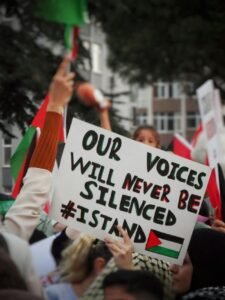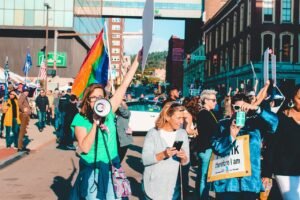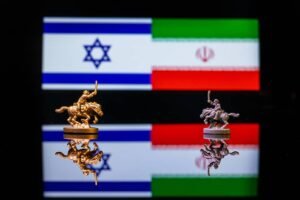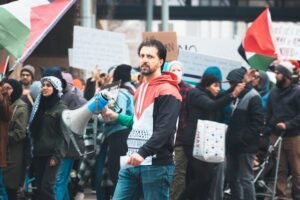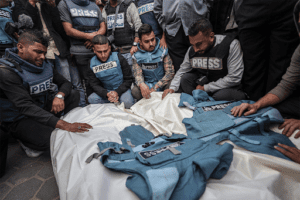The Operation Al-Aqsa Flood and its subsequent local, regional and global repercussions, restored the Palestinian cause to its pivotal position on the Arab, regional and international levels, placing it in a central position amongst the general public as a liberation struggle against colonialism and uprooting racism. This provides an exceptional historical opportunity to reestablish the Palestinian cause on the international level as a liberation struggle, facing the most unjust racist colonial aims in modern and contemporary history. This significant issue places a heavy load on not only the liberation activists but also all the vigorous social actors around the world, especially in the Arab region, who bear the responsibility to take action. Those people are obliged to pursue all possible means to support the Palestinian cause and keep pace with the global solidarity with this cause at various political, diplomatic, legal, media, cultural and intellectual levels. Hence, what kind of support is required in light of the challenges, risks and opportunities facing the Palestinian issue at this historical stage, in which the Al-Aqsa flood operation and its repercussions opened new horizons?
A framework to support the Palestinian cause in the post-Al-Aqsa flood should be based on the significance and weight of the situation, its repercussions, and the number of challenges and threats that the Palestinian cause is facing. This, in turn, brings forward a set of questions to determine the means and capabilities of support. From what Palestinian, Arab and international reality do we start to support the Palestinian cause? What are the most prominent changes brought about or demonstrated by the Al-Aqsa flood, which must be built upon in support of the Palestinian cause? What are the discourse and practical steps that must be considered to match the magnitude of the challenges and threats facing the Palestinian cause? Who are the political, cultural and social actors, capable of supporting the Palestinian cause and within what appropriate organizational formulas and frameworks?
Thinking about this issue stems from a new perspective of the historical trauma approach, concerned with understanding and interpreting the psychological, psychosocial, cognitive and behavioural effects of individuals and groups, and the consequences of major traumatic events that leave their footprint in history and influence the collective awareness regarding said events. The Operation Al-Aqsa flood and the genocidal war that followed in Gaza constituted a dual historical trauma, which the world has rarely witnessed in modern and contemporary history. It is a trauma where many military and strategic concepts were changed, axioms were shattered, narratives fell, and systems of values and laws were violated; even the paradigms of some civilizations of modernism and enlightenment will be exposed to accountability and critical questions, after the war.
Therefore, we are living the precise historical moment to put forward big ideas and influence broad segments of global public opinion and previous attitudes and positions, as well as to launch a global action to support the Palestinian cause; such an immense historical trauma is going to bring about a reconsideration of major ideas, preconceptions, prevailing narratives, stereotypes, and trends in public opinion, and is going to provide an opportune moment to reposition broad segments and groups of peoples, masses and elites in various parts of the world. However, the shakiness that the world witnesses today does not render the smooth transition to a better state, without any motivating effort and collective will, inevitable. Rather, there must be someone who understands the objective circumstances of this historical moment and its transformations, and how this opportunity, which is rarely repeated in history, can be seized.
1 – The Palestinian, Arab and international reality and the Palestinian cause
The Palestinian cause is perhaps one of the most unjust and complex topics in modern and contemporary history. The geopolitical facts and balances that the colonial powers were able to impose in the region and the world after the First and Second World Wars – for exporting their internal crisis and forcing their hegemony – and then, the formation of an imperial system led by the United States after the Second War (the Marshall Plan, the Bretton Woods system, and military superiority), were all that granted the Zionist plan the potential to succeed as a colonial project. More than that, confronting this project in Palestine and the region would be a confrontation with the colonial powers themselves. Consequently, the official Arab confrontation against this project has taken a declining trend since the setback of 1948, with which the establishment of the State of “Israel” was announced, through the 1967 war, which ended in a major Arab defeat and with the Arab regime’s recognition of “Israel’s” right to exist in the occupied Palestinian territories in 1948. Then again came the 1973 war that ended with the Camp David Accords and Egypt’s exit from the Arab-Israeli struggle, then the 1982 war in Lebanon, which carried out a strong blow to the Palestinian armed struggle abroad, but at the same time, it established the birth of a new era of armed confrontation against Israel.
But the greatest decline in the region apart from the defeat of 1967 came after the Second Gulf War in 1991, which established an official Arab regime subject to the unipolar world order led by the United States of America which consolidated its hegemony after the collapse of the Soviet Union in the same year. This unipolar world order was inclined to abandon the Palestinian cause, which was evident during the Madrid Conference in the same year, and then the Oslo Accords in 1993. Then the United States and Israel tried to remove the remaining obstacles by force, so came the invasion of Iraq in 2003, then the Lebanon War in 2006. Then the Arab Spring came, which ended in destroying and exhausting the remaining Arab countries that refused adherence to normalization and abandoning the Palestinian cause.
However, through the general declining trend of the Arab official system towards the Palestinian cause, the Arab-Israeli conflict, and Arab national security in general, the resistance has been growing in Lebanon since 1982, then it extended to Palestine, and later on to Iraq and Yemen. Thus, the resistance arose as the only military force opposing the Zionist project and American hegemony in the region, whilst the Arab armies were either incapable or not prepared or mobilized to wage war against “Israel”. The resistance forces began to establish new equations for military confrontations against “Israel” and the imperialist hegemony projects in the region. It is a resistance that was born from outside the box of the Arab official system, and it established a new phase of Arab national security in which the center of influence and defence of this national security was transferred from the hands of the Arab official regime and its armies – whose sole purpose is to defend their political regimes – into the hands of unofficial popular forces that bore the burdens of the Palestinian cause, the Arab-Israeli conflict, confronting imperialist hegemony in the region, and preserving Arab national security in general.
Yet this equation is problematically paradoxical, as the resistance which was the only side involved in making the military decisions against “Israel” and the American bases in the region, lacks parallel political decision-making, whether in its countries or at the level of the official Arab system in general. Perhaps, this is because the resistance parties did not work to accumulate elements of power at the political level as it has accumulated at the military level. Therefore, American influence and normalization in most Arab regimes maintained their momentum until the Al-Aqsa flood.
Today, we face an official Arab normalization system that works to end the conflict with “Israel” and concede all Palestinian and Arab rights. In the meantime, “Israel” is adopting harsher policies, centered around the uprooting of Palestinians, intending to achieve a pure racist Jewish state. On the other hand, the resistance is accumulating its expertise and military powers to confront “Israel” and imperialist interests in the region, all while suffering from deteriorating political, economic and social conditions in all the Arab countries where the resistance arose.
2- The changes brought about by the Al-Aqsa Flood: locally and globally
In light of the dire situation facing the Palestinian cause at the Palestinian, Arab and global levels, the Al-Aqsa flood came to re-impose a new reality on the Palestinian, “Israeli”, Arab and international arenas.
A – On the Palestinian level, the Al-Aqsa Flood Operation re-imposed the Palestinian cause as a pivotal issue at the Arab and global levels and restored the rights of the Palestinian people into the hands of the Palestinian resistance after these rights were subject to bargaining, and concession, and marginalization at the hands of the Palestinian Authority, the official Arab regime, and the Western countries led by the United States that are managing the Palestinian cause at the international level. If this operation, and the genocidal war that followed it in Gaza, does not lead to the cancellation of Arab normalization projects with “Israel,” it will at least curb and hinder them. This operation also emphasized the Palestinian people’s devotion to the option of resistance against “Israel”, which rejects any settlement that would restore to the Palestinian people any of their rights. This has deepened the predicament of the Palestinian Authority, whose termination has become a historical necessity for the Palestinian people and their resistance to hold the political decision-making, alongside the armed resistance, to liberate Palestine, restore the rights of Palestinian people, and build their independent Palestinian national state on the entire Palestinian soil.
B – On the “Israeli” level, the Al-Aqsa flood and the genocidal war that followed led to the creation of serious cracks in the material and immaterial structure of the “Israel” and its existential security. The fragility of the Israeli entity was exposed, its security and military superiority and its political and social stability eroded, and its inability to defend itself on its own deepened. This entity derives its strength and survival conditions from being a functional entity that serves the agendas of the international imperialist order led by the United States. All of this has driven the Jews of “Israel” to lose faith and confidence in their Jewish state, its military institution and the notion of a safe, protected society, as it also revealed the falsity of its narrative and its image on an international scale. The genocidal war waged by the “Israeli” army against Gaza has unveiled the barbaric racist face of “Israel”, which seeks to eradicate the Palestinian people in their historical land, either by displacement or by the carnage. This is a policy that the Israeli government and leaders began to express long before the Al-Aqsa Flood operation.
C – On the Arab world level, this comprehensive genocidal war, waged by “Israel” against Gaza, demonstrated the extent to which most Arab governments have abandoned the Palestinian cause, and the inability of the Arab regional order to provide even the most basic elements of support to the Palestinian people besieged in the Gaza Strip. Most significantly, some Arab governments are even participating in the siege of Gaza, and even more, some of these governments facilitate and accelerate the delivery of goods, probably of which are weapons, to “Israel”. In addition, some of these regimes are complicit not just against the resistance in Gaza, but against the axis of resistance in the region that supports Gaza. Some of these governments and their armies have not hesitated to use their air defence weapons to protect “Israel” from Houthi’s missile strikes. On the other hand, the Arab street has not been playing the minimum role required in the defence of Gaza, despite the horrible genocide that is being exercised by “Israel”, which raises questions about the reasons for the Arab street’s inactivity and failure in supporting the Palestinian cause, and thus its inability to bring about changes within its governments or regimes in the interest of the Palestinian cause.
D – On the International level, the Al-Aqsa Flood operation and the barbaric war that followed have revealed the extent of the strategic interdependence between “Israel” and the political system in the West, mainly the United States, and the pivotal functional role that “Israel” plays in Western imperialist hegemony. This desperate Western defence of “Israel” and the justification and permissibility of the massacres that “Israel” is committing in Gaza shows the extent of the falsity of the enlightenment and humanist cultural identity with which the West identifies itself and uses as a pretext to cover its wars and hegemonic projects. The flood has also disclosed the extent of degeneration in moral and ethical standards of the Western system and many of its political, intellectual, cultural and economic elites, who justify the worst forms of crime, racism and genocide in Gaza and defend the false narratives of Zionism.
However, the Gaza war has demonstrated important shifts in Western public opinion, especially amongst the Z Generation, including those at universities in the United States, of whom a high percentage is adopting a new approach to the Palestinian cause that goes beyond being a mere reaction to the massacres of thousands in the genocidal war in Gaza. Such an approach reaches the limits of renouncing the false “Israeli” narrative and adopting the historical facts of the Palestinian cause, which confirm that historical Palestine has been a land of Palestinian people for thousands of years, whereas “Israel” is just a colonial uprooting racist state. Even the opinion polls in the United States show that a wide majority of respondents support the removal of the “Israeli” entity and the establishment of a Palestinian state led by the Palestinian resistance.
3 – What to say and what to do? From reaction to action
In light of the Arab, regional and international circumstances and the shifts in worldwide public opinion regarding the Palestinian cause following the Al-Aqsa flood and the Zionist genocidal war in Gaza, what are the serious steps to be taken to support this cause? Is it enough to condemn the comprehensive genocide committed by “Israel” with the aid of American and Western support? Is it enough to call for demonstrations, to participate in activities in support of the Palestinian cause and to call for a ceasefire in Gaza? This would be just a reaction to the war in Gaza, which is much needed at the moment to push for a ceasefire. However, stopping within the limits of condemning Israel’s crimes is an acknowledgement of “Israel”, as it only condemns the “Israeli” behaviour. What about condemning and fighting the essence of the racist Zionist colonial project and its existence? This means that we must get out of the mechanisms of reaction and move to action, provided that this action is on the scale of the challenges and threats facing the Palestinian cause, and on the scale of the dangers represented by the racist Zionist project and its entity: “Israel”. Therefore, our role today should not be limited to merely defending Gaza or condemning “Israel”. Rather, this role should include defending the Palestinian people and liberating Palestine. Therefore, it is necessary to establish a global action for the liberation of Palestine. This action should keep pace with the global transformations through which the crisis of global imperialism is getting deeper and deeper – including the Zionist project – economically, politically, intellectually and morally, and restoring the central position of the Palestinian cause globally, especially since the current historical moment that the world is experiencing in the time of the historical trauma, caused by Al-Aqsa flood and the genocidal war in Gaza provides the necessary conditions for launching a global action for the liberation of Palestine, creating political, intellectual, cultural, legal and media visions, programs and tools that flow in the course of history toward the liberation of Palestine.
The time has come for us to establish a global action that is compatible with the challenges and threats, represented by “Israel” and Zionism on the one hand, and that keeps pace with the accumulated achievements of the Palestinian and Arab military resistance on the other. The liberation of Palestine eagle flies with two wings: a military wing and a political wing; one for hard power and another for soft power to confront the hard and soft powers of the Zionist-imperialist enemy at the same time.
Therefore, the general goal and slogan that is supposed to be defined for a global action like this represents a serious challenge. Any international liberation movement can neither offer half-solutions, nor partly-fair solutions, especially if it is the Palestinian cause and if the enemy is “Israel”, the colonial racist uprooting Zionist entity, whose characteristics do not seem to settle for half-solutions. Thus, the basic slogan of such a global action is supposed to be the liberation of Palestine, from the river to the sea, putting an end to the Zionist entity in Palestine, ensuring the return of all the Palestinian people to their land and building their independent state on their historical land. This is the discourse, and this is the vision upon which we must work to attract a global stream to support the Palestinian cause. It is the appropriate historical moment to launch this action, despite all the challenges and imperialist pressures that such a liberation movement may face.



